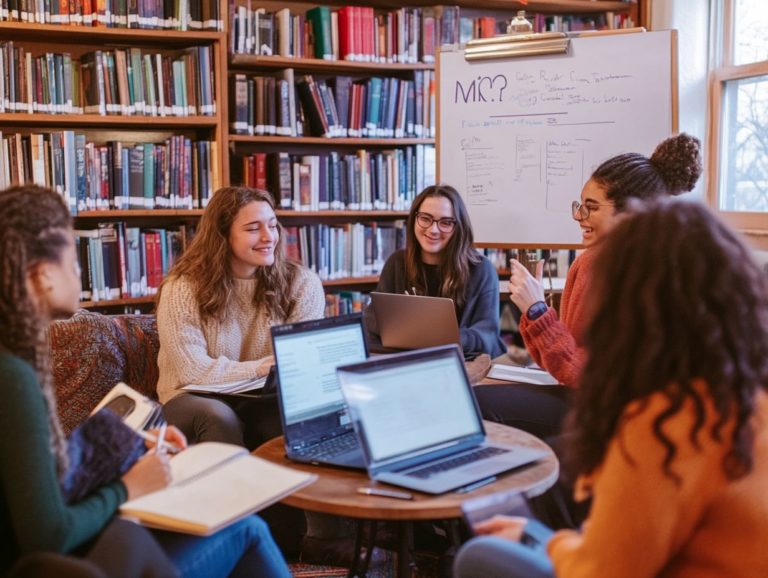the benefits of group study for test preparation
In the fast-paced realm of academic challenges, you ll find that group study stands out as a potent strategy for effective test preparation. Collaborating with peers not only deepens your understanding but also nurtures a sense of accountability and motivation.
This exploration delves into the many benefits of group study, from crafting strategies for working together to enhancing productivity with well-structured study plans.
It underscores the significance of effective communication and etiquette, ensuring that every member feels respected and valued. Embracing diversity within study groups can further enrich your learning experience.
Dive in and discover the secrets to successful group study sessions!
Contents
- Key Takeaways:
- The Importance of Group Study for Test Preparation
- Effective Group Study Techniques
- Maximizing Productivity in Group Study
- The Role of Communication in Group Study
- Group Study Etiquette
- The Benefits of Diversity in Group Study
- Frequently Asked Questions
- What are the benefits of group study for test preparation?
- Does group study help in boosting exam scores?
- How does group study aid in learning?
- Is group study effective for all types of learners?
- What are the advantages of group study over individual studying?
- Are there any disadvantages of group study for test preparation?
Key Takeaways:

- Collaborative group study allows for the sharing of ideas and knowledge, leading to a deeper understanding of the material and better preparation for tests.
- Establishing a study plan and clear goals within a group helps maximize productivity and keeps members accountable for their individual contributions.
- Embracing diversity in group study promotes a more well-rounded understanding of the material and encourages critical thinking skills.
The Importance of Group Study for Test Preparation
Group study is a game-changer for your test prep! It cultivates a supportive learning atmosphere where you can share study materials and engage in collaborative learning.
The true power of group study lies in its capacity to provide emotional support. It boosts motivation and encourages the exchange of diverse perspectives.
Participating in structured study sessions fosters accountability among peers, enhancing your overall time management and facilitating effective problem-solving.
This dynamic approach not only helps clarify concepts but also plays a significant role in achieving academic goals and alleviating anxiety during exam preparation.
Why Group Study is Beneficial
Group study is incredibly beneficial for you, as it enhances both motivation and accountability. Collaborating with study partners offers not just emotional support but also a wealth of diverse perspectives, which can ultimately help you understand the benefits of test preparation.
This collective effort keeps you on track with your studies while encouraging a vibrant exchange of ideas and strategies. When you work together, tackling complex subjects becomes far more manageable, allowing you to leverage each other’s strengths and deepen your understanding through different viewpoints.
Engaging in peer review within the group sharpens your critical thinking skills, as you evaluate one another’s work and provide constructive feedback that fosters growth. The social interaction naturally lifts your spirits, making learning not only more enjoyable but also less isolating.
This underscores the vital role of emotional support throughout your academic journey.
Effective Group Study Techniques
Effective group study techniques are vital for you to maximize the benefits of collaborative learning.
By adopting a structured approach, you can seamlessly share resources and study materials during your study sessions, enhancing both your understanding and retention of the material.
Collaborative Learning Strategies
Collaborative learning strategies are essential in group study, as they elevate critical thinking and cultivate problem-solving skills among participants.
By fostering open communication and encouraging diverse perspectives, these strategies empower you to engage in meaningful dialogues, deepening your understanding of complex concepts.
Techniques like sharing ideas and giving feedback can facilitate peer feedback; as one person shares their ideas, another offers constructive insights, creating a nurturing environment for growth.
Utilizing tools such as study groups or collaborative projects enhances your study skills, allowing you and your peers to teach one another, reinforcing your knowledge.
These interactions not only stimulate critical thinking but also aid in developing effective problem-solving skills, enriching the learning experience for everyone involved.
Maximizing Productivity in Group Study

To maximize your productivity during group study sessions, focus on crafting a comprehensive study plan. This plan should outline clear study goals, facilitate effective time management, and encourage accountability among your study partners.
By doing so, you ll create an environment that enhances both your learning and collaboration.
Creating a Study Plan and Setting Goals
Creating a study plan and setting specific goals are crucial steps for enhancing the effectiveness of your group study sessions while keeping your motivation levels high.
By mapping out a structured timeline and breaking subjects into manageable chunks, you can maintain focus and optimize your learning experience.
It s also wise to incorporate short breaks during your study sessions; these pauses can boost your energy levels and improve information retention.
Establishing accountability measures like forming study groups or using tracking apps can significantly strengthen your commitment to those goals.
This approach ensures that you stay on track while supporting one another, fostering a collaborative atmosphere where everyone feels valued and driven to succeed.
The Role of Communication in Group Study
Effective communication is crucial in group study settings. By honing your communication skills, you can significantly enhance group dynamics, enabling you and your study partners to offer constructive feedback and motivation to one another.
Effective Communication Techniques
Effective communication techniques are vital for building a supportive group atmosphere, allowing you and your study partners to offer emotional support and motivation to one another.
Use active listening strategies to ensure everyone feels heard and valued during discussions. This cultivates an atmosphere where individuals are encouraged to express their thoughts and feelings openly.
Use check-in rounds to gauge both emotional and academic states, keeping the group informed about each member’s progress and challenges. These practices enhance collaboration and build camaraderie, inspiring everyone to pursue their goals with renewed vigor.
When you all contribute to an inclusive dialogue, it minimizes misunderstandings and strengthens the group’s emotional resilience, making the study experience not only more enjoyable but also significantly more productive.
Group Study Etiquette
Understanding group study etiquette is essential for fostering a respectful and productive learning atmosphere. It’s important that you and your fellow members recognize various learning styles and show a commitment to the collective goals of the group.
This consideration enhances collaboration and ensures that everyone feels valued and engaged in the learning process.
Respecting Different Learning Styles

Respecting the various learning styles within your group study framework is crucial for fostering collaboration and maintaining a positive dynamic. When everyone feels emotionally supported, the group thrives.
By acknowledging the unique ways each person absorbs and processes information, your study group can create an inclusive environment where everyone has the chance to flourish. This approach enhances individual understanding and encourages the exchange of effective study techniques, resulting in richer discussions and deeper collective insights.
When group members honor diverse learning methods whether visual, auditory, or kinesthetic you empower one another, significantly enhancing communication and engagement.
This collaborative spirit ultimately cultivates a stronger sense of community, driving the group toward success through mutual respect and a shared commitment to learning.
The Benefits of Diversity in Group Study
Diversity in group study opens doors to countless exciting insights! When you gather a diverse group of students, you unlock a wealth of new perspectives that enrich the learning experience.
This collaborative dynamic not only fosters deeper understanding but also elevates the overall educational journey.
So gather your diverse study group today and experience the difference!
How Diversity Enhances Learning and Understanding
Diversity enhances your learning and understanding by creating collaborative environments where various viewpoints can be shared and discussed. This offers emotional support to everyone involved.
When you team up with individuals from diverse backgrounds, you enrich your discussions with unique insights. You cultivate a supportive space that helps solve problems better.
These varied perspectives give you the power to tackle complex concepts in innovative ways. This enhances both comprehension and retention. As you and your study partners navigate challenges together, you build emotional resilience and nurture a sense of belonging that can boost your motivation and engagement.
This collaborative atmosphere not only strengthens your academic performance but also equips you with essential skills that help you communicate and work well with others, preparing you for success in an increasingly diverse workplace.
Frequently Asked Questions
What are the benefits of group study for test preparation?
There are several benefits of group study for test preparation:
- Increased motivation
- Improved understanding of concepts
- Better time management skills
Does group study help in boosting exam scores?

Yes, group study has been proven to boost exam scores. It allows students to learn from each other, clarify any doubts, and cover more material in a shorter amount of time. To maximize effectiveness, you might want to consider best practices for group study.
How does group study aid in learning?
Group study allows for active learning, where students engage in discussions, ask questions, and explain concepts to each other. This promotes a deeper understanding of the material and retention of information.
Is group study effective for all types of learners?
Group study helps all types of learners. It offers different styles and perspectives. Visual learners can benefit from diagrams and charts, while auditory learners can benefit from discussions and debates.
What are the advantages of group study over individual studying?
Group study creates a dynamic and supportive learning space! It allows students to share resources, discuss difficult topics, and hold each other accountable. It also helps in reducing study anxiety and stress.
Are there any disadvantages of group study for test preparation?
While group study has its benefits, it may not work for everyone. Some students may find it distracting, and the group dynamic may not always be productive. It is important to find a balance and ensure everyone in the group is on the same page.
In conclusion, group study offers numerous benefits that can enhance learning and academic performance. For a deeper understanding of this approach, consider exploring using study groups: pros and cons. Don’t miss out on these advantages! Give it a try and unlock your potential!






